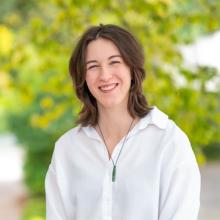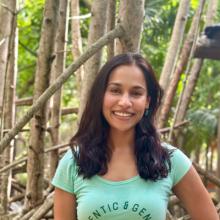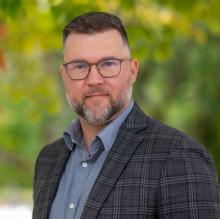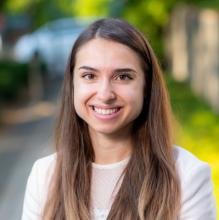Being a Public Scholar means leveraging the academic tools and knowledge that I am honing to contribute to real change. As a Public Scholar, I have a responsibility to the planet and to the communities that I work with. I am committed to designing research that is accessible, inclusive, collaborative and based on many stakeholders’ and rights holders’ needs.
Research Description
In an increasingly urbanized world, cities play an important role in the ecological crisis as they contribute disproportionately to biodiversity loss through land use change. Moreover, cities are home to more than half of the world’s population and are where people have everyday interactions with nature, yielding emotional, spiritual, and physical benefits to those who live and play in urban areas. As cities grow and green spaces are lost, so too are the benefits they provide to people and nature. In response, city governments increasingly prioritize biodiversity and nature’s benefits to people in planning efforts. However, municipal government planners, while equipped with a breadth of expertise, are constrained by available data to plan for various species and their interactions, among the many, and often, competing priorities for cities. Cities constitute systems of highly interconnected, dynamic social and ecological processes. To plan for biodiversity and human wellbeing, city governments must rely on a breadth of scientific knowledge, but also diverse ways of knowing and lived experiences. Doing so is pragmatically important, but also critical for more equitably representing multiple knowledge types and ways that diverse people relate to nature in cities. This project is a collaborative effort to braid multiple ways of knowing and types of expertise into urban biodiversity planning for the city of Vancouver. We employ an adapted expert elicitation workshop approach and interviews to prompt diverse participants about their ecological knowledge and values, and will use this co-created knowledge to generate visualisations of a future, biodiverse urban Vancouver and the policy steps that we can take to get there. I am working together with my colleagues Jo Fitzgibbons and Dan Forrest on this interdisciplinary PhD project, a first of its kind for the Public Scholars Initiative.
What does being a Public Scholar mean to you?
Humanity is facing widespread climate and ecological crises that have profound effects on people and nature. To me, being a Public Scholar means leveraging the academic tools and knowledge that I am honing to contribute to real change. As a Public Scholar, I have a responsibility to the planet and to the communities that I work with. I am committed to designing research that is accessible, inclusive, collaborative and based on many stakeholders’ and rights holders’ needs. Being a Public Scholar means that building relationships with community collaborators is central to the research process and not just an outcome. It means that we need to carefully design research that is not extractive, but honours the diverse knowledge that participants hold. Being a Public Scholar means working collaboratively across academic disciplines and practitioner expertise to design solutions that benefit the people and the planet.
In what ways do you think the PhD experience can be re-imagined with the Public Scholars Initiative?
Doctoral research contributes important insights to some of the most pressing problems facing humanity, but it is often conceptualized as an isolated endeavour, sometimes limiting the potential for this research to effect change. The Public Scholars Initiative is enabling me to adopt a different approach, one that is collaborative and co-produced. Together with two other Public Scholars, Jo Fitzgibbons and Dan Forrest, we are designing a collaborative dissertation that is based on our diverse training and expertise in natural and social sciences. With the support of the Public Scholars Initiative, we are able to work as a team - exposing us to new ways of thinking about complex problems, enabling us to identify many sides of the problem and an array of possible solutions, and affording learning in ways that solitary research cannot. This deeply collaborative process is what makes our dissertations unique and significantly enriches our doctoral learning.
How do you envision connecting your PhD work with broader career possibilities?
I see the Public Scholars Initiative as an invaluable opportunity to weave together practice and the academy. My research aims to make decision-making processes for the environment and natural resources more representative of multiple voices. Identifying mechanisms for more inclusive sustainability requires drawing from a wide set of academic disciplines, practitioner expertise, and diverse knowledge of people who affect and are affected by decision outcomes. I strive for a career that enables me to continue exploring these ideas through both academic and practical lenses. This might mean a career in city government, working as a research scientist for an NGO, or as a tenure track faculty member at a university. I am more committed to these ideas than a single career path and the Public Scholars Initiative affords many opportunities to explore these spaces through its diverse network of scholars, training opportunities, and support for community partners.
How does your research engage with the larger community and social partners?
This research is designed in collaboration with Jo Fitzgibbons and Dan Forrest, two Public Scholars who I am tremendously grateful for. Both Jo and Dan have enriched how I think about environmental problems and my dissertation research – I am fortunate to know them and be part of their team. Our diverse expertise in ecology, urban planning, environmental governance, conservation psychology and more has positioned us to design an interdisciplinary research project that aims to result in a comprehensive set of public and academic outputs. Working together has exposed each of us to diverse ways of knowing, methodological techniques, conceptual and theoretical lenses, and myriad goals for this work. Further, we are able to leverage our unique competencies and networks to reach a wide set of practice-oriented and academic communities as we design, conduct, and disseminate this research. We are working together with the City of Vancouver and the Vancouver Board of Parks and Recreation to develop this project. We have had multiple meetings with staff to understand current policy goals and motives for this research project, and each of us are even spending time embedded and working for these organisations. These mutually-beneficial placements allow us to gain in-depth, experiential and informal ethnographic understandings of how urban governance works, and we provide our partners with thorough information on topics pertinent to their needs and practice. We plan to engage multiple and diverse knowledge-holders in workshops and interviews about urban biodiversity. These broad “experts” include researchers, local and traditional knowledge holders, people with lived experience and varied formal education, and people with cultural values and knowledge about urban nature. In short, through our research, we are co-producing knowledge together with these diverse city residents, connecting them to City governance processes and sharing our opportunity to shape practice with them.
Why did you decide to pursue a graduate degree?
Toward the end of pursuing an undergraduate degree in Resource Conservation and Restoration Ecology, I enrolled in a Restoration Ecology course that included a field component whereby the class would interview public land managers across Illinois (USA) about conservation challenges and opportunities. Managers shared that the available data and scientific information was sufficient for identifying conservation strategies, but implementation was often complicated by public support/opposition for solutions. This class was formative and shaped my penchant for environmental social sciences. I was motivated to pursue a master’s degree largely focused on inclusive public land decision-making processes. Within my degree program, I worked on a project in Alaska whereby we aimed to better represent multiple voices of residents living nearby Denali National Park in decision-making for the park. As part of this work, we triangulated findings from the scientific literature with Alaskan’s expressed feelings of neglect and helplessness about public land management outcomes that substantially impacted their lives. Our team sought to soften tensions between local and agency-based knowledge by adopting a research approach that engaged decision-makers and residents in co-production of knowledge and values. My experiences working in Alaska shaped my research directions thereafter. Time spent in Alaska crystallized my passion for collaborative, community-based research aimed at empowering voices less represented in environmental decision-making. While working in Denali, it became apparent that empowering people to be part of change is critical, but to achieve social and ecological wellbeing, we must also transform decision-making structures to be more equitable, whereby individuals can more readily express their values pertaining to the environment. I was interested in continuing education that would enable me to explore these issues and apply and extend my skill set in the context of cities, rather than protected areas, given that cities are a critical driver of biodiversity loss, but also represent opportunities for everyday human-nature interactions and house over half the world’s population.
Why did you choose to come to British Columbia and study at UBC?
While applying to PhD programs, I sought to conduct research that incorporates multiple values into urban decision-making. I found a perfect fit with Dr. Kai Chan and his lab group (the CHANS lab) at the University of British Columbia’s Institute for Resources, Environment and Sustainability (IRES). I was initially attracted to IRES as a student seeking an interdisciplinary network of mentors and peers who could inform and support my proposed research initiatives while I, in turn, support their efforts. I knew that the exceptional range of expertise available at UBC would help me develop the skills necessary to pursue a career as an interdisciplinary scholar. Given the diversity of faculty and student expertise at IRES, I was excited about the opportunity to hone my existing research skills while investigating the social-ecological dynamics and opportunities for sustainable transformations in Vancouver. Through conversations with Kai and current CHANS lab students, such as Jo, I saw opportunities for collaborative, interdisciplinary doctoral research that would advance science and practice in the context of urban conservation. Alongside this research experience, the graduate training programs and courses offered at UBC made it abundantly clear that I would be in the right place to grow as a sustainability scholar as they spanned disciplinary boundaries and balanced academic and practice-oriented training. The commitment to highly interdisciplinary and problem-oriented scholarship at IRES and UBC has made this institution my scholarly home.




